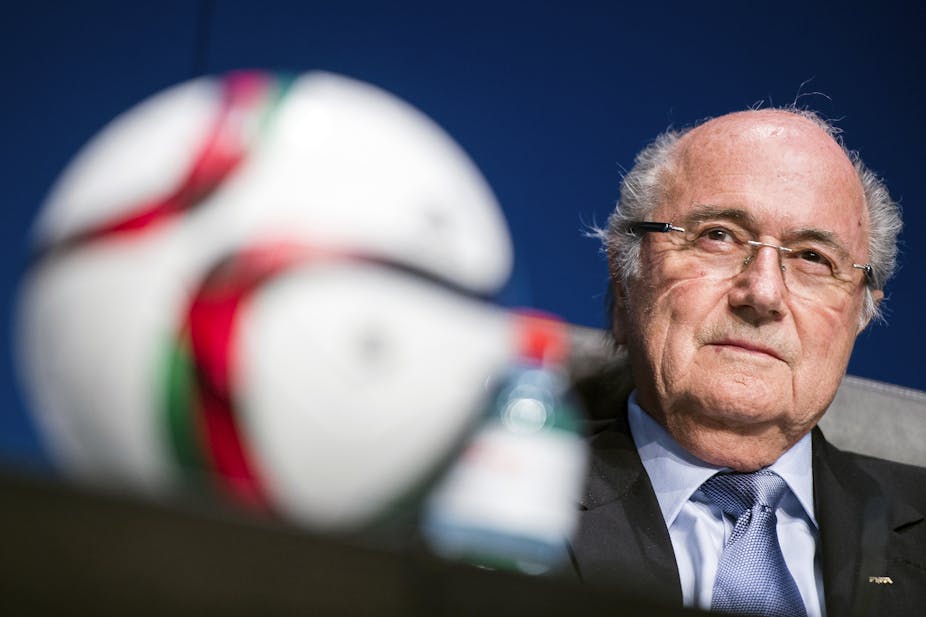That FIFA officials, past and present, are embroiled in investigations for an array of bribery, fraud and money laundering is both shocking and unsurprising. This is not the first time that FIFA has been associated with governance failure and lack of accountability. The way the organisation is set up means that pressure from sponsors could be the only way that things will change.
FIFA has long been seen as a self-servient institution; reluctant to allow any external involvement in its activities. Individuals such as the campaigning journalist Andrew Jennings have sought for many years to expose repeated failings in world football’s governing body. So, while some sponsors have severed their ties with FIFA, most have stuck with them, with much to gain from FIFA’s global market share.
A profitable non-profit
A non-profit organisation, FIFA lays claim to existing for the public interest and to holding an important place in global civic society. Its objectives range from narrow football-specific purposes through to rather abstract intentions such as improving the game of football constantly and promoting it globally “in the light of its unifying, educational, cultural and humanitarian values”.
But FIFA is also one of the most successful multinational enterprises in the world, having successfully expanded into emerging markets and has even started making inroads into the lucrative US market. It is also highly profitable, with the 2014 World Cup helping FIFA post a record revenue of US$2 billion last year and US$337m in profits coming from the four-year cycle leading up to the finals in Brazil.
Accountability
FIFA’s primary accountability is to its national member associations and regional federations. These stakeholders are the principal financial beneficiaries of the organisation’s commercial success. They are also the groups responsible for electing the FIFA officials who are in control of distributing the organisation’s financial rewards. In these circumstances it is not difficult to see the limitations in conventional systems of hierarchical and independent accountability.
But given the organisation’s repeated failures, one frustration has been the unwillingness of other commercial sponsors and partners to play a more active role in seeking to improve governance, transparency and accountability. Considering the amount they contribute to FIFA’s total revenues (nearly a third), they should have some clout.
FIFA’s corporate sponsors are a veritable who’s who of powerful multinationals: Visa, McDonalds, Adidas, Budweiser, Coca-Cola. Their response to scandals that have occurred over the years – whether it is the conditions of workers involved in building World Cup infrastructure or bribery and corruption – have tended toward public statements expressing “disappointment” and “desire for change”.

‘Voice’ and ‘exit’
Multinational sponsors are, of course, at risk from their relationships with FIFA. They therefore have a direct stake in FIFA’s performance, reputation and standing. But, until there is any prospect of this impact on their own financial performance or status, sponsors have seemingly been content with economist Albert Hirschman’s notion of governance by “voice” and not “exit”.
This is the idea that companies (as well as customers and civilians) have the choice of voicing their dissatisfaction in a business relationship or severing ties with (exiting) it. FIFA’s sponsors have always opted with the “voice” option, restricting their attempts at influence to dialogue, instead of stronger action. Unfortunately, however, FIFA’s track record suggests that this has been a dialogue of the deaf.
Ostensibly Visa’s more concrete threat to exit following the latest scandal may turn out to be highly significant in FIFA’s reform. They wouldn’t be the first to leave, however. In 2014 Emirates and Sony both decided not to renew their sponsorship contracts amid the last corruption probe.
So far, other top tier sponsors Coca-Cola and Adidas have merely voiced concern. Decisions to take the more dramatic route of severing ties with FIFA are of course predicated on the objectives of these multinationals and their accountability to their own shareholders.
But what is emphatically clear now is that there is a growing business risk from their association with FIFA. Together with the charges being pursued by US and Swiss prosecutors, ironically it may well be market accountability that will provide the most likely route to lasting reform of this supposedly public interest organisation.

